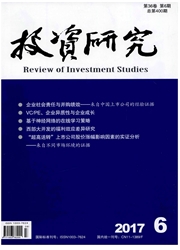

 中文摘要:
中文摘要:
动量效应是证券市场中普遍存在的"异象"之一,以往对其存在性的研究多从风险、股票特征、市场状态等角度出发而忽略了投资者情绪可能带来的影响。基于此,文章根据所构建的投资者情绪复合指数将样本期划分为情绪乐观期和情绪悲观期,以我国上证A股市场为例,实证检验了不同情绪期内动量收益的变动情况,结果发现动量效应更易在情绪乐观期出现,即便在控制住风险、股票特征、市场状态等因素后,这一结论仍然成立,由此说明投资者的乐观情绪才是我国股市产生动量效应的主要影响因素。
 英文摘要:
英文摘要:
Momentum effect is one of the common "anomalies" in stock market, the extant research of its existence mostly rely on the angle of risk, stock characteristics, market status, etc. and ignore the impact of investor sentiment. Based on this, this pa- per according to the investor sentiment composite index which was constructed divide the sample period into optimistic period and pessimistic period and take the Shanghai A-share market as example to empirically test the change of momentum return in different sentiment periods. The result show that the momentum effect is more likely to appear in optimism, even after control- ling for the risk, stock characteristics, market status, etc., this conclusion is still founded, thus, it is to illustrate that the opti- mism is the main factor influencing the momentum effect in China's stock market.
 同期刊论文项目
同期刊论文项目
 同项目期刊论文
同项目期刊论文
 期刊信息
期刊信息
